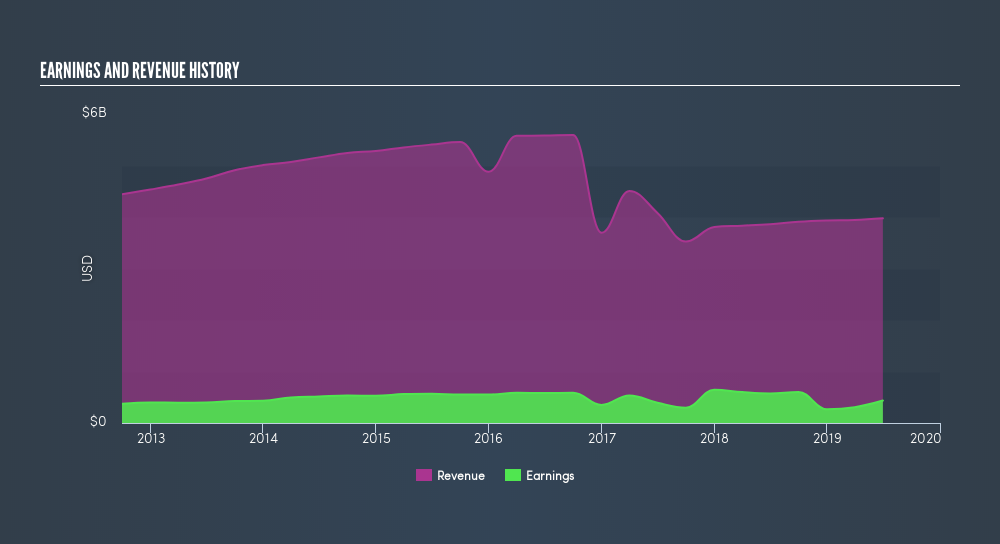- United States
- /
- Hospitality
- /
- NYSE:TNL
What Kind Of Share Price Volatility Should You Expect For Wyndham Destinations, Inc. (NYSE:WYND)?

Anyone researching Wyndham Destinations, Inc. (NYSE:WYND) might want to consider the historical volatility of the share price. Modern finance theory considers volatility to be a measure of risk, and there are two main types of price volatility. The first type is company specific volatility. Investors use diversification across uncorrelated stocks to reduce this kind of price volatility across the portfolio. The second type is the broader market volatility, which you cannot diversify away, since it arises from macroeconomic factors which directly affects all the stocks on the market.
Some stocks mimic the volatility of the market quite closely, while others demonstrate muted, exagerrated or uncorrelated price movements. Beta can be a useful tool to understand how much a stock is influenced by market risk (volatility). However, Warren Buffett said 'volatility is far from synonymous with risk' in his 2014 letter to investors. So, while useful, beta is not the only metric to consider. To use beta as an investor, you must first understand that the overall market has a beta of one. Any stock with a beta of greater than one is considered more volatile than the market, while those with a beta below one are either less volatile or poorly correlated with the market.
See our latest analysis for Wyndham Destinations
What WYND's beta value tells investors
Looking at the last five years, Wyndham Destinations has a beta of 1.55. The fact that this is well above 1 indicates that its share price movements have shown sensitivity to overall market volatility. If the past is any guide, we would expect that Wyndham Destinations shares will rise quicker than the markets in times of optimism, but fall faster in times of pessimism. Share price volatility is well worth considering, but most long term investors consider the history of revenue and earnings growth to be more important. Take a look at how Wyndham Destinations fares in that regard, below.

How does WYND's size impact its beta?
Wyndham Destinations is a fairly large company. It has a market capitalisation of US$3.7b, which means it is probably on the radar of most investors. It takes deep pocketed investors to influence the share price of a large company, so it's a little unusual to see companies this size with high beta values. It may be that that this company is more heavily impacted by broader economic factors than most.
What this means for you:
Since Wyndham Destinations tends to moves up when the market is going up, and down when it's going down, potential investors may wish to reflect on the overall market, when considering the stock. This article aims to educate investors about beta values, but it's well worth looking at important company-specific fundamentals such as Wyndham Destinations’s financial health and performance track record. I urge you to continue your research by taking a look at the following:
- Future Outlook: What are well-informed industry analysts predicting for WYND’s future growth? Take a look at our free research report of analyst consensus for WYND’s outlook.
- Past Track Record: Has WYND been consistently performing well irrespective of the ups and downs in the market? Go into more detail in the past performance analysis and take a look at the free visual representations of WYND's historicals for more clarity.
- Other Interesting Stocks: It's worth checking to see how WYND measures up against other companies on valuation. You could start with this free list of prospective options.
We aim to bring you long-term focused research analysis driven by fundamental data. Note that our analysis may not factor in the latest price-sensitive company announcements or qualitative material.
If you spot an error that warrants correction, please contact the editor at editorial-team@simplywallst.com. This article by Simply Wall St is general in nature. It does not constitute a recommendation to buy or sell any stock, and does not take account of your objectives, or your financial situation. Simply Wall St has no position in the stocks mentioned. Thank you for reading.
About NYSE:TNL
Travel + Leisure
Provides hospitality services and travel products in the United States and internationally.
Undervalued average dividend payer.
Similar Companies
Market Insights
Community Narratives





